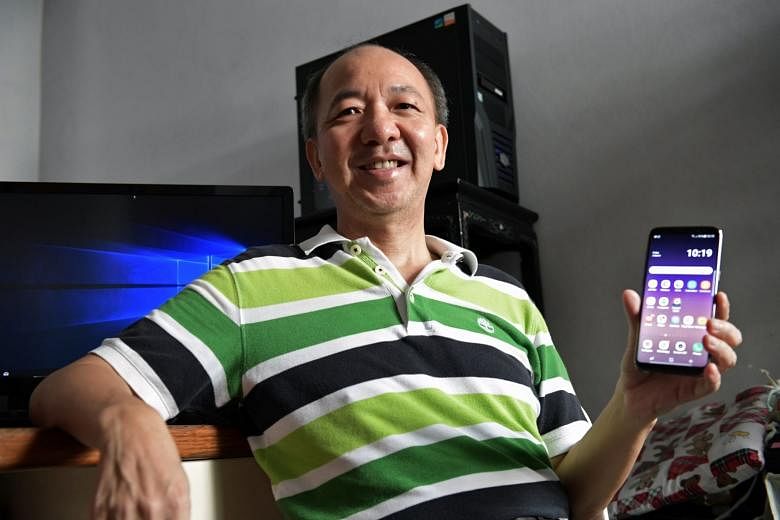SINGAPORE - Mr Liu Ming Ching, 59, uses a smartphone app to pre-order food and beat the queue at Koufu foodcourt. In addition, he uses the Singtel Dash e-payment app to get 5 per cent cash back on his shopping at FairPrice supermarkets.
Technology use is second nature to him, a computer science and electronic engineer by training. But the retiree understands that many senior citizens struggle even with topping up their ez-link card electronically, even more so with sophisticated tasks such as discerning fake news and scams.
"I can lead by example and have the time to share my experiences," said Mr Liu, a volunteer working with the Infocomm Media Development Authority (IMDA) to teach the elderly how to use technology.
He is looking forward to be involved in a series of new courses being rolled out to better prepare senior citizens for a digital lifestyle.
The expanded curriculum covers topics from the use of e-payment, chat apps and digital government services, to spotting fake news and online scams, said Senior Minister of State for Communications and Information Janil Puthucheary in Parliament on Tuesday (March 6).
During the debate on the Ministry of Communications and Information's budget, Mr Saktiandi Supaat (Bishan-Toa Payoh GRC) had asked what was being done to help citizens, especially seniors, to be digitally ready.
Ms Sun Xueling (Pasir Ris-Punggol GRC) had also asked how the Government would help the elderly become more aware of and take precaution against cyber risks.
"We have redefined digital inclusion as more than just access but also equipping people with skills," said Dr Janil, acknowledging the challenge in his reply.
"Being digitally ready is also about having the skills to use digital technology safely and confidently," he said, noting that the expanded curriculum was created to take care of such needs.
For instance, the six-hour-long Basic Digital Skills training will be offered from the middle of this year to train those aged 40 and above how to transact and communicate online safely and spot fake news and online scams, among other things.
"To ensure that everyone can benefit from this, we will provide training for these basic skills in all four languages by the end of the year," said Dr Janil.
Another form of help, called Digital Clinic, has been running at community clubs and public libraries since November last year. It teaches basic smartphone skills such as how to connect to Wi-Fi hot spots and access digital government services.
To encourage those aged 50 and above to go cashless, the IMDA will also roll out Experiential Learning Journeys, where seniors will be guided by youth volunteers to download banking apps to receive credits and food discounts, top up their ez-link cards electronically and make payments using quick response (QR) codes.
Since IMDA introduced its Silver Infocomm Initiative in 2007, it has reached some 190,000 seniors with the help of 700 volunteers.


